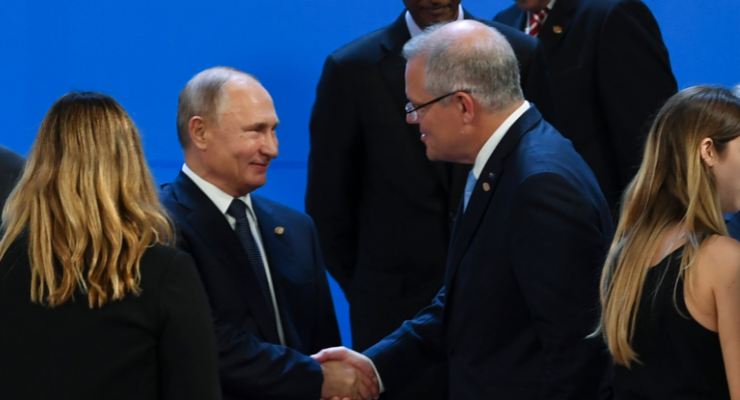
Australia is set to join Western allies in implementing “swift and severe” sanctions against Russia in response to President Vladimir Putin’s aggression towards Ukraine.
This morning the National Security Committee of Cabinet will meet to finalise sanctions, hours after US President Joe Biden called Putin’s actions “the beginning of a Russian invasion of Ukraine”.
Yesterday Putin announced Russia recognised the independence of Donetsk and Luhansk, two separatist regions in eastern Ukraine, and said he would send troops in for “peacekeeping missions”, widely viewed as a pretext for a full-scale invasion.
Australia’s ties with Russia are limited, and with our sanctions to be announced after the US and UK revealed theirs, we still don’t know the extent of the financial impact. But past decisions, and other restrictions imposed by Australian allies, give some indication of what our actions might look like.
The existing sanctions
As Foreign Affairs Minister Marise Payne reminded the ABC this morning, Australia already has some sanctions in place against Russia. In 2014 the Abbott government began imposing a series of sanctions after it annexed Crimea and Sevastopol. The sanctions began by targeting 12 individuals “instrumental” in Russia’s threat to Ukrainian sovereignty.
Further sanctions were imposed later that year after ongoing military pressure towards Ukraine, which included restrictions on some commercial activity with Russian banks in the annexed regions, bans on importing arms material from Russia and any goods from Crimea and Sevastopol.
Around that time Abbott also threatened to “shirtfront” Putin over the downing of Malaysia Airlines flight MH17, shot down by pro-Russian rebels.
The list of individuals targeted by sanctions has also increased — as of 2021, there are 168 individuals and 52 entities with close ties to Putin or otherwise involved with the annexation.
In terms of further action, Payne has suggested Australia would use “whatever tools we have available”, and has flagged expelling Russia’s ambassador. Meanwhile Ukraine’s top diplomat in Australia, Volodymyr Shalkivskyi, said further sanctions should hit Russia in its most vulnerable areas of energy and finance.
Action taken by allies
Australia’s sanctions will provide little more than symbolic support for American and European actions.
So far, the Biden administration has taken some additional action against Russia, and has promised to impose more measures if there is further escalation. The first tranche of sanctions, announced yesterday, targeted two financial institutions — VEB Bank, controlled by the Kremlin and Promsvyazbank, Russia’s military bank, and placed restrictions on Russia’s sovereign debt, aimed to cut the country off from Western finance. It also targeted five individuals from Putin’s inner circle — including Federal Security Service (FSB) head Alexander Bortnikov, and Putin’s first deputy chief of staff, Sergei Kiriyenko.
Meanwhile, Germany took the major step of effectively halting approval for the Nord Stream 2 gas pipeline between it and Russia. The $11 billion pipeline, owned by Russian state-backed Gazprom, is significant because oil and gas make up about 50% of Russian exports. The European Union has also announced limited, partial sanctions.
Overnight British Prime Minister Boris Johnson announced a series of sanctions, targeting five banks and three individuals. The banks — Rossiya Bank, General Bank, IS Bank, Black Sea Bank and Promsvyazbank — aren’t key financial institutions but are said to be linked to Putin’s inner circle. Three influential Putin-aligned oligarchs — Gennady Timchenko, Boris Rotenberg and nephew Igor Rotenberg — are targeted.
So far, Western sanctions could go further, but leaders are hoping to slowly escalate in response to any further Russian aggression. At their toughest, sanctions could cause inflation and a sharemarket crash in Russia. But Putin has withstood a series of economic measures from the West before. Since the post-Crimea sanctions in 2014, Russia has undertaken a “de-dollarisation” strategy that has left its economy stronger and less vulnerable to the West.








We are totally insignificant in the scheme of things. Sanctions won’t work, as China will look after Putin. Morrison will look for photo ops, and try to look tough to aid his election prospects.
Perhaps we should send Dutton to have words with the Tsar. They’d probably get on like a house on fire.
Can someone explain why our dear Maise is over there? as Drandy said We are totally insignificant in the scheme of things, Sanctions won’t work. and will ultimately fall in line with the big boys and girls at the table.
Surely she has some more useful to do back home.
ABsolutely correct. However, we win brownie points with the US, just as the LNP have done with China. The sadly deficient Aus Guvm’t doesn’t imaging the US and others will now fill the gaps in our trade with China, happily supplying barley, wine, etc. while our farmers go broke. Well done, Dutton and Scomo…well done.
Send Tony Abbott in to shirtfront Putin. I am sure Spud and Frydenfroide, in Morrison’s absence at a presser, will hold Tone’s hand while he is doing it,
Just like the Morrison govt failed
Russia has sanctions on Australia, no kangaroo meat exports from OZ to Russia allowed.
How much were they receiving before the sanctions?
Was it pet food or table food?
They were eating it, Russia was the biggest importer of Kangaroo meat in the world. Not my ideal choice of meat though.
Well, of course – Comrade Skippy was way big in the Caucasus.
I’m pretty sure it was eaten in high end restaurants in Moscow and St Petersburg not in the Caucasus.
out comes the much used morrison wet lettuce leaf
Russia and China must thing we’re hilarious. Like an annoying mosquito, despite the power crazy egos of most in the Guvm’t.
Self delusion carries no weight in the big league.
Russia is in a much stronger financial position than it was in 2014, it also now has pipelines in operation to China. These new sanctions are just token.